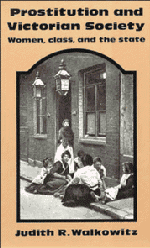Book contents
- Frontmatter
- Contents
- Preface
- Introduction: The Revolt of the Women
- Part I Prostitution, Social Science, and Venereal Disease
- Part II The Contagious Diseases Acts, Regulationists, and Repealers
- Part III Two Case Studies: Plymouth and Southampton Under the Contagious Diseases Acts
- 8 Plymouth and Southampton Under the Contagious Diseases Acts
- 9 The Repeal Campaign in Plymouth and Southampton, 1870–4
- 10 The Making of an Outcast Group: Prostitutes and Working Women in Plymouth and Southampton
- 11 The Hospitals
- 12 The Local Repeal Campaign, 1874–86
- Epilog
- Notes
- Selected Bibliography
- Index
9 - The Repeal Campaign in Plymouth and Southampton, 1870–4
Published online by Cambridge University Press: 01 June 2011
- Frontmatter
- Contents
- Preface
- Introduction: The Revolt of the Women
- Part I Prostitution, Social Science, and Venereal Disease
- Part II The Contagious Diseases Acts, Regulationists, and Repealers
- Part III Two Case Studies: Plymouth and Southampton Under the Contagious Diseases Acts
- 8 Plymouth and Southampton Under the Contagious Diseases Acts
- 9 The Repeal Campaign in Plymouth and Southampton, 1870–4
- 10 The Making of an Outcast Group: Prostitutes and Working Women in Plymouth and Southampton
- 11 The Hospitals
- 12 The Local Repeal Campaign, 1874–86
- Epilog
- Notes
- Selected Bibliography
- Index
Summary
On a midsummer day in 1870, Eliza Binney, a prostitute living in Plymouth, emerged from an examination house where a doctor had just certified that she was suffering from venereal disease. Binney was ordered to go to the lock hospital in Devonport, escorted by a plain clothes metropolitan police officer. As they were about to set out, the pair encountered two middle-class repeal agents, Mrs. Elizabeth King and Mr. Daniel Cooper. Mrs. King, parasol in hand, pressed Binney not to go unless she had signed the voluntary submission provided by law. A scuffle ensued as Binney resisted the officer and King “pushed the constable aside and took hold of Binney by the waist, upon which Inspector Anniss, who had come out of the station, took Mrs. King by the arm and pushed her aside.”
Meanwhile, a crowd of about a hundred and fifty people had collected to watch the incident. King and Cooper were charged with interfering with the police and were later forced to stand trial. Eliza Binney, for her part, was dragged off screaming to the hospital. Examination there revealed that she was not diseased after all. Hospital officials released her the next day, but she was still subject to police surveillance and fortnightly internal examination.
The trial of Cooper and King on July 28 represented the dramatic high point of the “Siege of Devonport,” a period of intense local political activity against the Contagious Diseases Acts.
- Type
- Chapter
- Information
- Prostitution and Victorian SocietyWomen, Class, and the State, pp. 171 - 191Publisher: Cambridge University PressPrint publication year: 1980



